‐Nissan Shatai Kyushu- A plant which is allowed to engage in production of the INFINITI brand

The vehicle-manufacturing plant of Nissan Shatai Kyushu, which has the capacity to produce 120,000 vehicles per year, incorporates all the best practices of vehicle-manufacturing in the Nissan Group and is located in the Kitakyushu region, which offers major distribution advantages to the Asian region that is experiencing remarkable development.
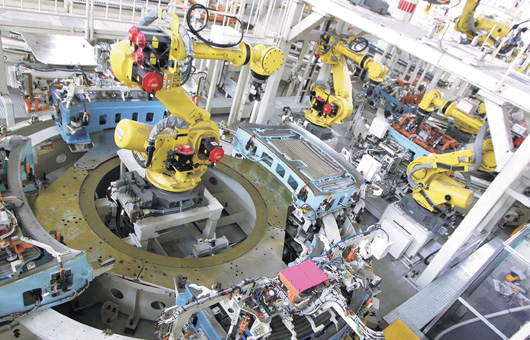
Compared to previous press forming, roller hemming improves accuracy, quality, and finish when processing the edges of parts that consist of two joint panels, such as doors.
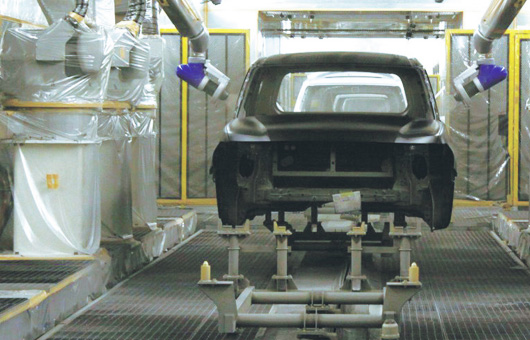
Newly developed equipment sprays the topcoat while evaporating water and the water-absorbong undercoat. This eliminates the previous bake-drying process, which was originally required after the application of the middle coat, and ensures the highest quality finish for luxury vehicles which had not been possible in previous 3WET painting systems.
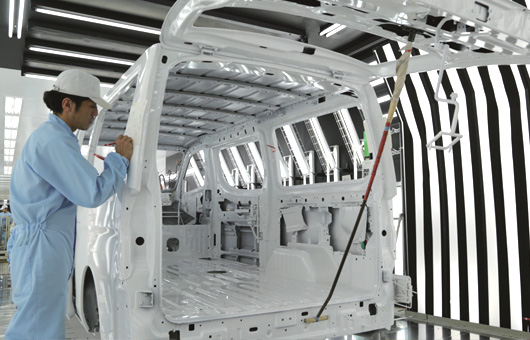
The painted parts of all vehicles are illuminated with a zebra lighting. This improves visibility for the manual inspection of the paint job. The detailed inspection ensures that the quality of the paint job is paerfect.
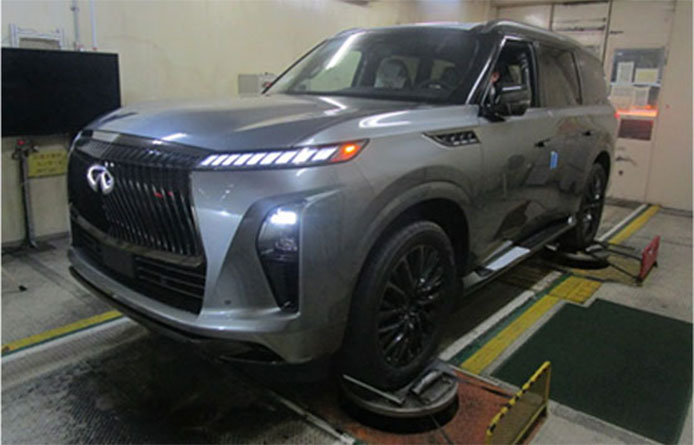
We have recreated the same viberations generated when a vehicle is driven on roads around the world. Uncompromising inspection tests are conducted to check all vehicles and ensure high quality.
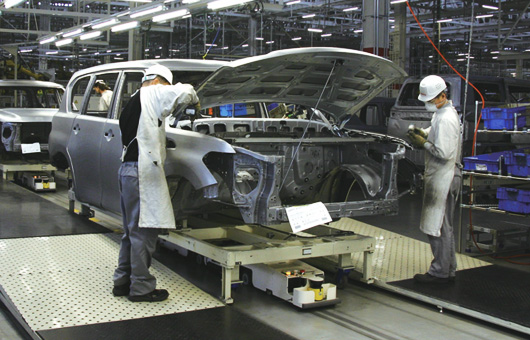
We use unmanned AGV conveyor vehicles to transport car bodies in a compact and flexible manner within the plant. This new system replaces large-scale conveyor facilities.
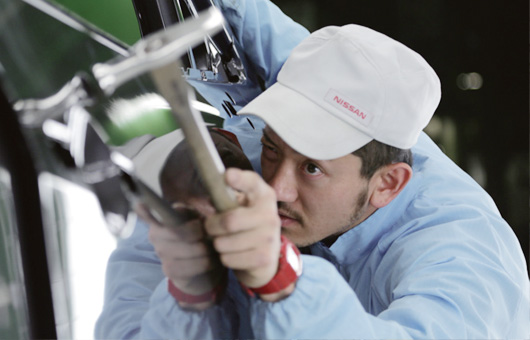
Employees selected through an "artsan" certification system, which marks these employees as highly-skilled leaders, guide the company to achieve even greater heights in product quality 1 through their unsurpassed skills.
The INFINITI production base

INFINITI "QX80"
The plant produces six models: the premium brand INFINITI "QX80," the" Patrol Y62", “Patrol Y63” SUVs mainly for the Near and Middle East market, the "Elgrand" minivan for the domestic market, the "Armada" SUV mainly for the North American market, and the commercial-use van "Caravan". This plant plays the role as the sole plant of the Nissan Group plants in Japan, capable of producing full-size SUVs and large minivans.
Of the vehicles produced at this plant, we have established the most stringent quality standards for the brand INFINITI. There are currently only five plants in the world that are authorized to produce INFINITI vehicles. At Nissan Shatai Kyushu, all vehicles that are produced undergo a paint job quality inspection on the zebra lighting paint inspection line, as well as checks for noise and vibration using a vibration tester for four-wheel chassis vehicles. Through these processes, we hold fast to our ideal of realizing uncompromising inspection quality. In addition, by mobilizing the unsurpassed capabilities of employees who are highly skilled in the respective processes that they are responsible for, we are striving to ensure the highest quality for the INFINITI brand, and have won accolades for our top-class quality in global market surveys.
As a member of the globally expanding Nissan Group, Nissan Shatai Kyushu aims at realizing a benchmark plant with the combined strengths of Q (Quality), C (Cost), and T (Time).
Introduction of robot technology

Production of engine hoods in roller hemming line
Nissan Shatai Kyushu has incorporated the robot technologies based on vehicle manufacturing knowhow that the Shonan Plant has built up over its long history. Some examples include the introduction of the roller hemming line, which produces high-precision, high-quality, and beautiful finish as compared to molding processes that make use of conventional pressing processes. Its main facilities are a body assembly shop with roller hemming technology and flexible lines that make use of AGV, a paint shop that balances quality with environmental friendliness through the introduction of the 3WET painting system, and an assembly shop that has achieved further advancements in the mixed flow production of frame and monocoque vehicles through knowhow passed on from the Shonan Plant, and which is characterized by thorough quality management such as four-wheel vibration testing for all vehicles in production.
Environmentally-friendly plants

Water-based 3WET painting which reduces our environmental impact.
The Nissan Group undertakes various initiatives as part of its commitment to Nissan‘s environmental policy of "Symbiosis of People, Vehicles and Nature." Of course, Nissan Shatai Kyushu is also fully committed to putting in place measures for the realization of this philosophy. These include, for example, reducing CO2 emissions through the adoption of 3WET painting, as well as vehicle design based on recycling design guidelines. In the assembly process, where it is generally difficult to automatize processes using robots, the plant has created an employee-friendly environment through means such as introducing the use of assistive devices to reduce the burden on workers.